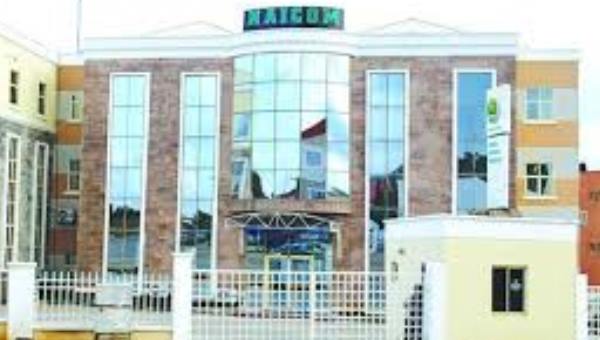E-Business
NAICOM Blames Inappropriate Technology for Growing Offshore Reinsurance

Mr. Sunday Thomas, the Commissioner for Insurance, has attributed lack of appropriate technology for indigenous insurance firms losing of underwriting businesses in oil, gas and aviation sectors.

Thomas, therefore advised insurance underwriting firms operating in Nigeria, to invest significantly in technology to propel their operations in the industry.
Thomas, who spoke at a recent insurance conference in Lagos, said the industry must as a matter of priority invest significantly in technology so as to make meaningful impact in the industry.
The NAICOM boss, lamented the declining participation of local insurance firms in big ticket businesses due to lack of appropriate technology, adding that, “the market must emulate technology to move forward.”
Apparently worried by this development, he said, “insurance companies are losing underwriting businesses in oil, gas and aviation sectors.”
“The industry must invest handsomely in technology which is one of our key drivers for developing the market.
“Institutions should be prepared to digitalise their processes, procedures and systems in order to make their operation seamless and real time,” he added.
The NAICOM boss stated that the Commission was investing heavily in automating its processes and expects nothing less from insurance institutions.
“As business owners and as businesses spring up, we must ensure that we put the right processes in place in trying to manage our assets and ensure that we have more strategic thinking,” he added.
Thomas, noted that more businesses were being reinsured abroad, thereby further eroding the capacity of the local market.
“More businesses especially in the aviation sector and oil and gas are now being reinsured abroad.
“Of more concern is the declining participation of life companies in the annuity business which is the emerging business for our industry.
“These are the areas where the industry can impose itself on the economy through the control of funds for national development; unfortunately, we are missing it,” he said.
The Commissioner further advised members of the insuring public not to discard insurance as part of measures to cut cost in the face of the harsh economic situation.
He said: “It is good to reduce cost but in terms of insurance, people should ensure that all assets are adequately insured.
“It is good to have a good risk management framework as well as be able to manage our insurances and assets.
“Many are left with the option of cutting cost, however, not all cost cutting will measure success and some might even end up hurting our businesses.”
Thomas, however, said the insurance industry has proven its relevance in the affairs of the economy.
“Risk is part of our business endeavors and the best thing is to evaluate and see what part of the risk you can transfer,” he said.
E-Business
NITDA DG Reaffirms FG Commitment to Responsible and Inclusive AI

The Federal Government of Nigeria has reaffirmed its commitment to building a responsible, inclusive, and sovereign artificial intelligence ecosystem to enable Nigeria to transition from being a passive consumer of AI technologies to an architect and builder of indigenous AI systems.

This was said by the Director General of the National Information Technology Development Agency (NITDA), Kashifu Inuwa Abdullahi CCIE, while delivering a virtual address at the InnovateAI Conference held in Lagos.
The conference brought together policymakers, technology leaders, innovators, and stakeholders to discuss the future of artificial intelligence and its role in driving Nigeria’s digital economy and national development agenda.
Inuwa outlined Nigeria’s ambition to transition from being a consumer of artificial intelligence technologies to becoming a builder and owner of AI systems that reflect national values and priorities, in line with the National AI Strategy.
“Our goal is not just to use AI, but to architect and build our own AI systems in Nigeria,” he said, stressing that the country must take ownership of its AI future.
He noted that Nigeria’s approach to artificial intelligence extends beyond innovation to include governance, infrastructure, data sovereignty, and policy evolution.
According to him, “Responsible AI is never a finished job; it is an iterative journey. Our policies must evolve as the technology evolves, and we must avoid frozen laws by adopting living policies that adapt over time.”
He cited the implementation of the Digital Economy and E-Governance Bill as a key mechanism for generating insights that will help refine AI regulations and governance frameworks.
Inuwa also highlighted the challenge of data representation in global AI systems, noting that most models are trained on non-African datasets, which often results in bias against local dialects, cultures, and demographics.
“If a model shows bias against a local dialect or demographic, we cannot just patch it. We must reinvest in infrastructure to retrain it with inclusive and representative local datasets,” he stated.
He added that building national AI infrastructure is critical to achieving data sovereignty and ensuring that Nigeria is not merely an end user of foreign AI systems.
He further called for strategic partnerships with global technology companies and hyperscalers to build AI infrastructure in Nigeria while aligning with local values and national priorities.
“The world today is a global village. We need to work with global players, but they must understand our local nuances and help us build the infrastructure to retrain and develop AI models that reflect our context,” he said.
The NITDA Director General explained that adopting a comprehensive AI lifecycle approach, from responsible data collection and governance to deployment and continuous feedback, will enable Nigeria to move from reacting to AI developments to proactively designing indigenous AI systems.
“Without understanding how AI models are trained, how decisions are made, and how models are retrained, it will be difficult to build a responsible and trustworthy AI system,” he warned.
He reaffirmed that the Federal Government is intentional about promoting responsible AI and is working closely with the technology ecosystem to co-design national AI guardrails. He described platforms such as the InnovateAI Conference and other national AI dialogues as critical to shaping Nigeria’s AI future.
E-Business
Mutual Benefits Assurance Settles ₦5.9bn Claims in January 2026

Mutual Benefits Assurance, a leading Nigerian insurance company, has paid a total of ₦5,937,665,353.57 in claims to policyholders in January 2026 alone, underlining its strong financial capacity and unwavering commitment to prompt claims settlement.

Mutual Benefits Assurance
A breakdown of the figures shows that ₦3,426,602,834.28 was paid under its General (Non-Life) Insurance portfolio, while ₦2,511,062,519.29 was paid across its Life businesses, including Group Life and Retail Life policies.
The significant payout within a single month reinforces Mutual Benefits’ reputation as a dependable insurer that honors its obligations swiftly and responsibly.
Commenting on the development, Olufemi Asenuga, Managing Director, Mutual Benefits Assurance Plc stated that claims settlement remains the core promise of insurance and the ultimate test of an insurer’s credibility.
“Insurance is built on trust. Our ability to settle over ₦5.9 billion in claims in one month demonstrates not only our financial strength, but also our deep commitment to our policyholders. At Mutual Benefits, we do not just sell policies. We stand by our promises,” he said.
With over three decades of operations, Mutual Benefits has consistently positioned itself as a strong and well-capitalised insurer.
The company operates both Life and General Insurance businesses and remains fully compliant with regulatory capital requirements as stipulated by the National Insurance Commission (NAICOM).
The January payout reflects Mutual Benefit’s robust underwriting standards, prudent risk management practices and efficient claims administration framework.
It also aligns with the company’s broader record of substantial claims settlement in recent years, reinforcing its standing as a trusted brand in the Nigerian insurance industry.
Mutual Benefits employs over 5,000 staff, managed by seasoned management team and an experienced Board of Directors. Industry observers note that prompt claims payment remains one of the most critical differentiators in Nigeria’s competitive insurance landscape.
By consistently settling valid claims without delay, Mutual Benefits continues to strengthen customer confidence, deepen market trust and expand its footprint across retail and corporate segments.
As the company begins 2026 on a strong footing, it reiterates its commitment to innovation, service excellence and delivering value to policyholders and stakeholders alike. Mutual Benefits Assurance focused on its mission to provide reliable risk protection solutions while maintaining the highest standards of professionalism and integrity.
E-Business
NITDA Warns Nigerians of Actively Exploited Microsoft Office Vulnerability

National Information Technology Development Agency (NITDA) has issued an urgent cybersecurity warning about a serious Microsoft Office vulnerability (CVE-2026-21509) that attackers are actively exploiting.

This advisory, shared through Nigeria’s Computer Emergency Response Team (CERRT.NG), highlights the risks of this flaw and recommends immediate action to protect systems.
Microsoft has released quick security updates to fix this vulnerability, which has a severity score of 7.8, showing it is a serious risk. Attackers have already used it in targeted attacks.
CVE-2026-21509 affects multiple versions of Microsoft Office, including Office 2016, Office 2019, Microsoft 365 Apps, Office 2021, and later versions.
This flaw allows attackers to bypass security features meant to stop harmful Object Linking and Embedding (OLE) controls. OLE is an older Microsoft technology that can be used to embed links or content, but it has often been exploited by malware.
By exploiting this flaw, attackers can create specially designed Office documents.
When a user opens these documents, they can run malicious code or gain further access to the system.
Exploitation requires user interaction, meaning attackers often trick people into opening harmful Word, Excel, or other Office documents. Common methods include using email attachments or files from untrusted sources.
Because Microsoft confirmed that the vulnerability is being actively exploited, they have made emergency security updates available outside their usual schedule. Users and organisations should:
- Install the latest Microsoft Office security updates for all affected versions.
- Restart Office applications for Office 2021 and later to ensure that the updates take effect.
- Use registry-based settings for protection if updates can’t be applied right away.
- Follow good cybersecurity practices, like using endpoint protection and filtering emails.
Microsoft’s updates for Office 2021 and newer versions are automatically applied, but need a restart of the applications to be active.

 Telecom3 days ago
Telecom3 days agoBanks, Telcos Settle Four-Year Dispute over N300Bn USSD Debt

 General News2 days ago
General News2 days agoHow JustMarkets Is Empowering African Traders with Global Market Access

 Telecom2 days ago
Telecom2 days agoGroup Condemns Gabon’s Social Media Shutdown Amid Protests

 E-Financial2 days ago
E-Financial2 days agoACAMB Educates Content Creator to Curb Misinformation on Bank Recapitalisation

 General News3 days ago
General News3 days agoPalmPay Unveils First Batch of Winners in #LoveWithPalmPay Campaign

 E-Business2 days ago
E-Business2 days agoMutual Benefits Assurance Settles ₦5.9bn Claims in January 2026

 E-Financial3 days ago
E-Financial3 days agoFirstCap MD says Payment Security Remains Biggest Barrier to Bankable Gas and Power Projects

 Telecom2 days ago
Telecom2 days agoIXPN Positions as the Regional Internet Exchange Hub for West Africa




















